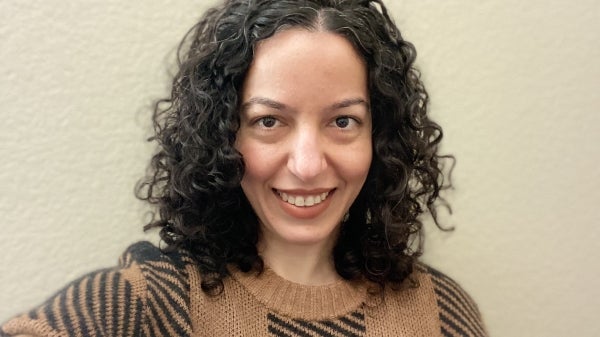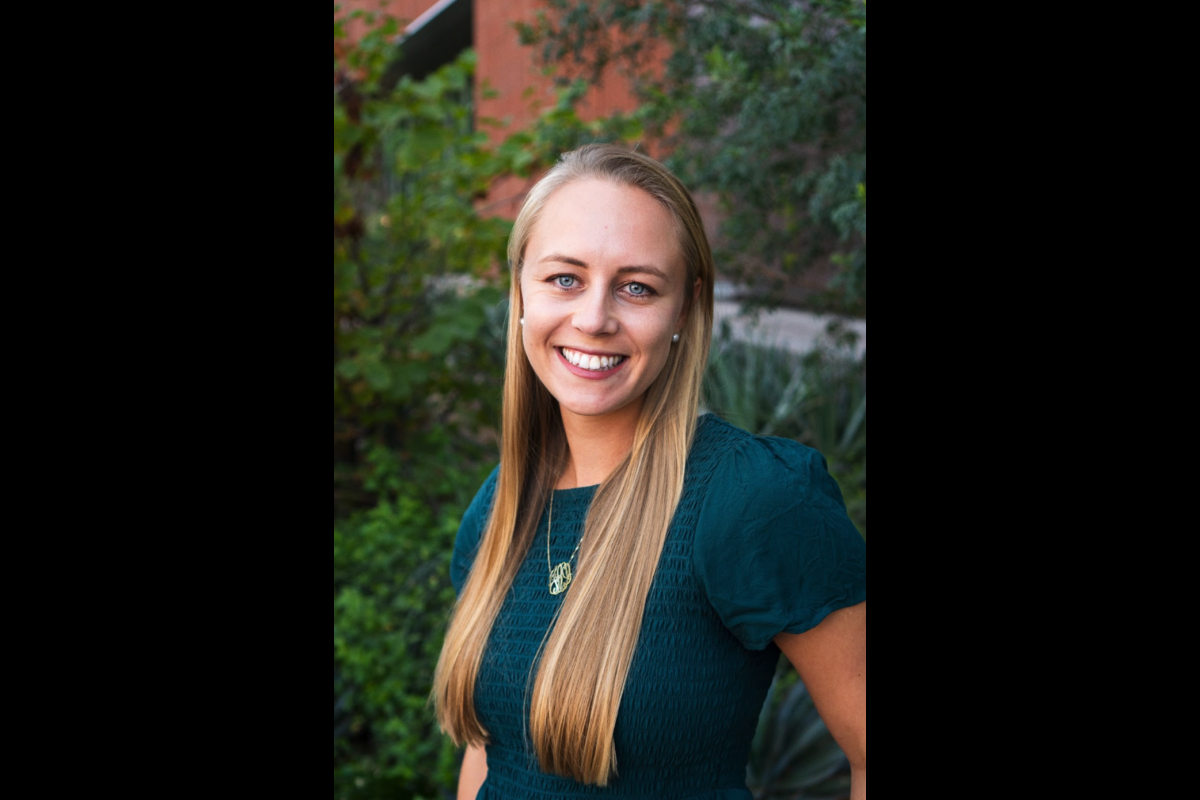When skipping the first week of graduate school saves a life

While at ASU, Jamie Katz worked to get more Sun Devils on the national bone marrow registry.
Editor’s note: This story is part of a series of profiles of notable fall 2024 graduates.
Jamie Katz was on a 12-day road trip across country to begin studying psychology at Arizona State University when she got a call asking her to donate bone marrow to an 11-year-old girl fighting leukemia right away.
She emailed her professors, told them she would be absent from class and went to California to donate.
“The first week of graduate school was the most chaotic week, probably of my whole life,” Katz said. “It was a little bit of a whirlwind settling into ASU, but it was 100% worth it. I got to save a young girl's life.”
Katz called the match a magical coincidence because the first time she was swabbed to be a bone marrow match was for another young girl fighting leukemia — her cousin Amy.
“I was seven years old, so I didn't really know what was going on, but I got swabbed. It’s a little cheek swab to see if I was her match. Unfortunately, I was not. No one in our family was,” Katz said. “Ever since then my family has been really involved with getting as many people as we can to sign up.”
She joined the national registry when she turned 18 and began volunteering with various organizations. After her undergraduate degree, Katz started facilitating a workshop with the Smith Center for Healing and the Arts, a cancer nonprofit in Washington, D.C. There, she led a discussion about the possibilities of leveraging positive emotions to feel better.
“If you’re just constantly bombarded by bad news and feeling bad physically, where does the hope come from? Where does the joy come from?” Katz pondered with the group.
That line of questioning eventually drew Katz to Professor Michelle “Lani” Shiota in the Department of Psychology in The College of Liberal Arts and Sciences.
“When I was looking for grad schools, I was looking at who was doing research in this area and (Shiota) has always been at the top of my list,” Katz said.
In Shiota’s lab, they investigate positive emotions, like awe and wonder emotional regulation and emotion as a mechanism for behavior changes.
“Being able to do research in a lab that is also thinking about practical applications and ways that we can actually use what we’re learning to help people was super exciting. Getting to work with Dr. Shiota is a dream come true,” Katz said.
Throughout her Sun Devil experience, Katz has engaged with multiple research projects, served as the president of the Psychology Graduate Student Association and became the manager of the Shiota Psychophysiology Laboratory for Affective Testing, or SPLAT Lab.
“(The lab) allows me the opportunity to ask really creative and complex questions and then have to think really hard and critically about how to answer them. It’s really challenging, but that's part of the fun,” she said.
This December, Katz will graduate with her master’s degree but will continue at ASU working toward her PhD in psychology.
“I definitely feel like I'm very well prepared to explore the different paths that are out there,” she said. “Having a career path that impacts and helps people is really important to me.”
Learn more about the bone marrow registry
When people with blood cancer or diseases like leukemia or lymphoma are not responding to treatments, a bone marrow transplant is a possible option. A bone marrow transplant is when bone marrow is taken from one person, and given to the patient in need to replace diseased cells with healthy ones. Finding a match for a transplant can be difficult and when family members are not a match, patients turn to the national registry.
“By joining the registry, you are essentially saying that you would allow a patient in need to get in contact with you if you’re a genetic match, which is about a .25% chance,”” Katz said.
To learn more about donating bone marrow, visit www.giftoflife.org.
As an ambassador for Gift of Life, Katz continues to introduce more people to the bone marrow registry. She visits classrooms, attends club meetings and hosts events across campus.
“At this point, I have signed up about 1,000 students at ASU,” she said.
November is National Marrow Awareness Month and this year it came with exciting news. Katz was notified of her first ASU match ー another Sun Devil matched with a 64-year-old battling non-Hodgkin lymphoma.
“The feeling of helping someone is a good one,” she said. “In a tangible way, it has been something that's really kept me motivated and grounded in a PhD program or in research”. Research can take years, but signing people up for the registry takes five minutes, she explained.
“And that’s a life saved.”
Question: What was your “aha” moment when you realized you wanted to study the field you majored in?
Answer: I took an AP psychology course in my senior year of high school, and I found that I actually enjoyed reading the textbook and would read ahead from what was assigned. I was answering more questions in the class than the teacher was, and that's when I knew I had a passion for psychology. Once I got to college, I continued to take psychology courses and really enjoyed them because I was able to relate what I was learning to my everyday life. When I went to my first psychology conference in 2020, I realized that I wanted to pursue a career and a PhD in psychology because I was having so much fun going to all of the talks and learning about so many different areas of research.
Q: Why did you choose ASU?
A: I chose ASU for the fit of my mentor and for the overall quality of the training and access to resources as an R1 (Research 1) institution. Also, Phoenix was a city I was excited to explore. I love all things outdoorsy, including hiking, jogging, swimming, climbing, etc., so I was excited to be near mountains and in the warm sunny weather.
Q: What’s something you learned while at ASU — in the classroom or otherwise — that surprised you or changed your perspective?
A: Through all of my various statistics classes at ASU, I've really gained a new perspective in evaluating research overall. I've learned about the replication crisis context that plagues our field alongside the various data analysis techniques. … I have a new definition of what it means to be certain and what it means to have data that supports a hypothesis. I've learned to think critically about what a conclusion is actually based on, and it's been amazing to be able to learn from experts in the field about how a researcher's choices affect the conclusions we reach from our data.
Q: Which professor taught you the most important lesson while at ASU?
A: I would say I've learned the most valuable lessons from my advisor Lani (Shiota). She has an amazing record of high-impact publications and prestigious positions like editor of journals, head of the social psych area, advisor to the Phoenix City Council, etc., all while still making time to mentor, teach and really work closely with her students. She's taught me so much about how to effectively conduct and communicate research, but also about how to advocate for myself and ask for help when I need it. She's taught me that I can use research to help people and really make a difference in the world, but I have to think critically about the questions that I'm asking and attempting to answer. I really look up to her a lot.
Q: If someone gave you $40 million to solve one problem on our planet, what would you tackle?
A: With $40 million I could buy a lot of mosquito nets and help eradicate if not drastically reduce malaria rates in third-world countries. I read a really interesting book called “Doing Good Better” about effective altruism, and I remember that buying mosquito nets was one of the most effective ways to help the most at-risk populations that is relatively simple. Since $40 million can't do all that much to stop climate change or get rid of food insecurity, I'll go with the most simple but utilitarian answer I can think of.
Q: What’s the best piece of advice you’d give to those still in school?
A: Remember your "why" on the days that things get hard and stressful. This will keep you grounded and motivated to keep going.
More Sun Devil community

Dean's Medalist plans to pursue research in machine learning
Editor’s note: This story is part of a series of profiles of notable fall 2024 graduates.Justin Le is an Arizona native, born in Glendale and raised in Peoria. While attending high school,…

Student triumphs over adversity, becoming first-gen graduate and Dean’s Medalist
Editor’s note: This story is part of a series of profiles of notable fall 2024 graduates.Alaleh Moslehpour’s parents were both teenagers when they immigrated to the United States from Iran…

Serving success: Starbucks celebrates ASU graduates at special forum
For many, the journey to earning a degree is a deeply personal dream. For Starbucks partners graduating from Arizona State University this semester, it’s also a powerful story of resilience,…


